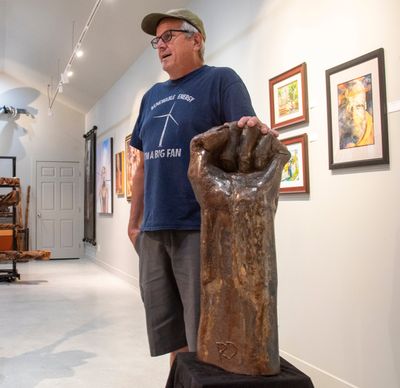Coeur d’Alene City Council deems Spokane artist’s depiction of raised fist too controversial for public display

Spokane artist Rick Davis watched a livestream of the Coeur d’Alene City Council meeting on Monday and had a feeling of deja vu.
A group of impassioned citizens were demanding lawmakers not install Davis’ fabricated steel sculpture of a raised fist on public property. They’d done the same a decade ago, when Davis built a human-sized sculpture of the Hindu deity Ganesha.
“It was a different climate then,” Davis, a part-time sculptor and electrician who counts among his collaborators the Garbage Goat’s creator Sister Paula Turnbull. “It was 10 years ago. You wouldn’t think it would be different, but it’s a lot different now.”
The City Council voted 5-1 to reject Davis’ artwork, titled “Solidarity.” The piece was recommended for inclusion in Coeur d’Alene’s “ArtsCurrents” program, which provides a $1,000 annual stipend to artists in exchange for displaying their work publicly around town, and the city in turn receives a commission if the piece is sold.
For more than an hour, residents came to the microphone and said the artwork did not display the shared values of North Idaho. Several speakers linked the image with communism, socialism and the Black Lives Matter movement.
“The clenched fist is a revolutionary, and a communist symbol, and it has no place as public art in Coeur d’Alene,” said state Rep. Joe Alfieri, one of the speakers against the piece.
Davis acknowledged that the fist has been used by communist leaders in the past. However, it’s also been used by those who have fought communism and oppression, including Lech Welesa, the Polish dissident who fought Soviet rule, and Nelson Mandela, the South African president imprisoned in opposition to apartheid. It was perhaps made most famous by Olympians Tommie Smith and John Carlos during a medal ceremony at the 1968 games.
More recently, the symbol has appeared on the flag of the Black Lives Matter social movement. It was also flashed by U.S. Sen. Josh Hawley on the steps of the U.S. Capitol on Jan. 6, 2021, just before a group of President Donald Trump’s supporters violently stormed the Capitol.
Davis said the art is not intended to promote any one specific ideology.
“It’s always used by people who are an underclass, or oppressed,” Davis said.
The emotional crowd caused Mayor Jim Hammond to call a recess in the middle of public comment. At the end of that testimony, Hammond encouraged lawmakers to forward the art proposals without Davis’ submission, saying he was swayed by the words of military veterans who fought against communist regimes.
“I just didn’t want to put up art that offended veterans,” Hammond said in an interview Friday. “We had veterans there expressing exactly that concern.”
Davis said his art was not intended to make any statement about those who served in the military.
“This has nothing to do with veterans, whatsoever, on any level,” Davis said.
Coeur d’Alene City Councilwoman Christie Wood, a member of the Kootenai County Task Force on Human Relations, voted against installing the artwork after making a request that the piece reside in a private gallery while still paying Davis the annual stipend.
“I can tell you it was an incredibly difficult decision,” said Wood, who told the audience she didn’t believe they wanted government telling them what art to look at or which books to read.
“We ended up having to go with a value judgment, and I had to go with my gut, would this be divisive for our community, or would it be educational?” Wood said.
Davis said he appreciated Wood’s work on human rights issues in the community, but believed the council could have more strongly stood up for public art that prompts conversation and discussion of difficult issues.
“Show leadership. Don’t follow the crowd, and that’s what they’re doing here; they’re following the crowd,” Davis said.
Councilman Dan English was the lone vote in favor of the art, and he said he also noticed the vocal opposition that was on display. But he said lawmakers shouldn’t be swayed by that, noting several people wrote to voice full-throated support of the artwork.
“I don’t make any votes by popularity contest, with an applause or ‘boo’ meter in the crowd,” English said.
He pointed to Davis’ artist statement, which made no mention of a specific ideology. The statement notes the piece’s title because of the fist as “a powerful contemporary and historic symbol of solidarity with those who struggle for human rights and stand with marginalized groups.”
Following the council’s vote, Davis’ piece will remain at Shotgun Studios, a gallery in Spokane’s Peaceful Valley run by friends of the artist, John and Kathy Thamm. “Solidarity,” and Davis’ depiction of Ganesha, are available to view by appointment at the gallery, and Davis is still looking for a buyer. The Ganesha was moved there after its stay in Coeur d’Alene.
The vote by the council won’t deter him from submitting future artwork to the public, including in Coeur d’Alene, Davis said.
“I don’t try to dictate or predict the reaction,” Davis said. “I’m invigorated when there is a reaction.”